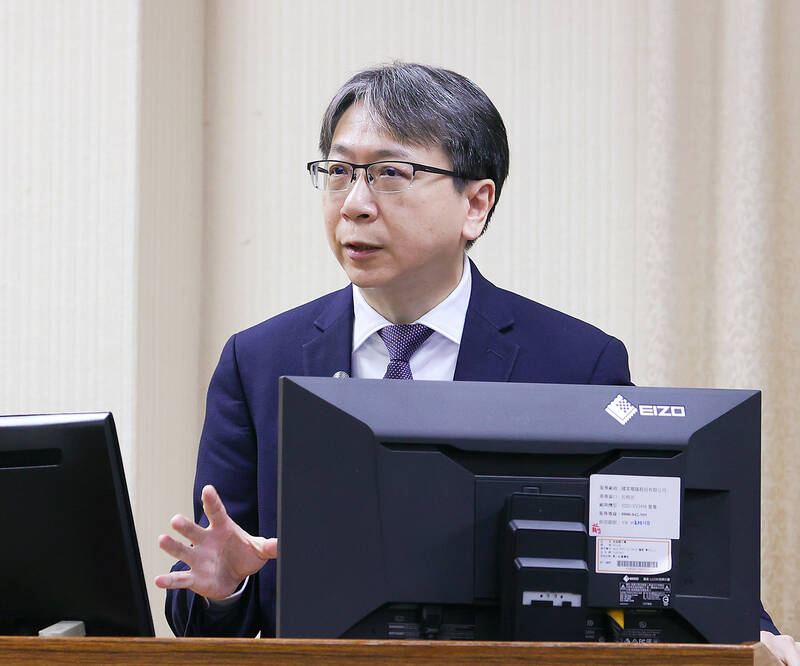China could use its self-developed generative artificial intelligence (AI) applications to intensify cognitive warfare against Taiwan, National Security Bureau Director-General Tsai Ming-yen (蔡明彥) said yesterday.
Tsai made the remarks during a meeting of the legislature’s Foreign and National Defense Committee, in which he and Overseas Community Affairs Council Minister Hsu Chia-ching (徐佳青) briefed lawmakers on how the government copes with the “hybrid threat” from China, including escalating military intimidation, increasing manipulation of controversial information, promoting unification with China and breaching key infrastructure.
The development of deepfakes, ChatGPT and social media would enable the Chinese Communist Party (CCP) to intensify cognitive warfare against Taiwan, the bureau said in a report to the committee.

Photo: CNA
“It has come to our attention that China has developed its own chatbots, such as Ernie Bot. We are closely watching whether it will use new generative AI applications in disseminating disinformation,” Tsai told reporters on the sidelines of the meeting.
Asked whether China has begun to interfere in Taiwan’s presidential election next year, Tsai said the bureau is watching whether Beijing is imposing external pressure on Taiwan through military or economic threats, whether it is trying to influence the outcome of the election through disinformation and whether it is sending funds to candidates via hidden channels or virtual currency.
Tsai also commented on former Air Force Command major Chiu Shih-ching’s (邱世卿) remark that Taipei and Hsinchu County would be the most dangerous places in Taiwan should a war break out in the Taiwan Strait.
“Deterring the occurrence of a war remains the top priority in our national defense policy. We are simulating war scenarios and preparing counterstrategies accordingly,” Tsai said.
The bureau in its report also said the CCP is using different strategies to challenge the “status quo” across the Strait and creating internal conflicts in Taiwan by exaggerating the benefits of cross-strait exchanges.
First, Beijing is creating a war atmosphere by launching military exercises around Taiwan, spreading disinformation and amplifying CCP propaganda, the bureau said.
Second, it is creating a general distrust in the US’ commitment to Taiwan by using issues such as Taiwan Semiconductor Manufacturing Co’s establishment of a chip plant in the US, it said.
Third, it is attacking or hacking into key infrastructure in Taiwan and spreading or selling stolen data online, the bureau said, adding that the extensive media coverage of the cybersecurity breaches would cause people to lose confidence in the government.
“Beijing is blaming Taipei for a slower-than-expected recovery of normal cross-strait exchanges after the COVID-19 pandemic,” it said.
“It has also announced that it is launching trade investigations into Taiwanese goods and agricultural products, which could continue until before the presidential election next year,” the bureau said.
China “has attempted to sway the political preference of Taiwanese voters and create internal conflicts, which would help it spin the cross-strait issues in its favor,” it added.
Tsai also said that he would meet with former White House National Security adviser John Bolton, who arrived in Taiwan yesterday.

Taiwan is to commence mass production of the Tien Kung (天弓, “Sky Bow”) III, IV and V missiles by the second quarter of this year if the legislature approves the government’s NT$1.25 trillion (US$39.78 billion) special defense budget, an official said yesterday. Commenting on condition of anonymity, a defense official with knowledge of the matter said that the advanced systems are expected to provide crucial capabilities against ballistic and cruise missiles for the proposed “T-Dome,” an advanced, multi-layered air defense network. The Tien Kung III is an air defense missile with a maximum interception altitude of 35km. The Tien Kung IV and V

The disruption of 941 flights in and out of Taiwan due to China’s large-scale military exercises was no accident, but rather the result of a “quasi-blockade” used to simulate creating the air and sea routes needed for an amphibious landing, a military expert said. The disruptions occurred on Tuesday and lasted about 10 hours as China conducted live-fire drills in the Taiwan Strait. The Civil Aviation Administration (CAA) said the exercises affected 857 international flights and 84 domestic flights, affecting more than 100,000 travelers. Su Tzu-yun (蘇紫雲), a research fellow at the government-sponsored Institute for National Defense and Security Research, said the air

Taiwan lacks effective and cost-efficient armaments to intercept rockets, making the planned “T-Dome” interception system necessary, two experts said on Tuesday. The concerns were raised after China’s military fired two waves of rockets during live-fire drills around Taiwan on Tuesday, part of two-day exercises code-named “Justice Mission 2025.” The first wave involved 17 rockets launched at 9am from Pingtan in China’s Fujian Province, according to Lieutenant General Hsieh Jih-sheng (謝日升) of the Office of the Deputy Chief of the General Staff for Intelligence at the Ministry of National Defense. Those rockets landed 70 nautical miles (129.6km) northeast of Keelung without flying over Taiwan,

A strong continental cold air mass is to bring pollutants to Taiwan from tomorrow, the Ministry of Environment said today, as it issued an “orange” air quality alert for most of the country. All of Taiwan except for Hualien and Taitung counties is to be under an “orange” air quality alert tomorrow, indicating air quality that is unhealthy for sensitive groups. In China, areas from Shandong to Shanghai have been enveloped in haze since Saturday, the ministry said in a news release. Yesterday, hourly concentrations of PM2.5 in these areas ranged from 65 to 160 micrograms per cubic meter (mg/m³), and pollutants were